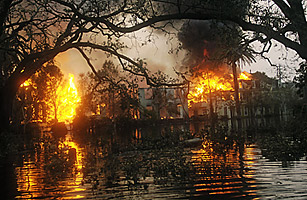
Arsonists set fire in the day days after Katrina hit New Orleans
(2 of 3)
The Petro-State
"this is crippling us! Devastating us!" Ewell Smith was outraged. He represented Louisiana's seafood industry, and three months after the BP blowout, oil was still cascading into the Gulf. But Smith wasn't outraged about the spill; he was outraged by President Obama's moratorium on new deepwater drilling — and he was speaking out at a drill-baby-drill "Rally for Economic Survival" at the Cajundome in Lafayette. "Oil and gas is a way of life down here, just like fishing," he explained later. "The fishermen all have brothers and cousins on the rig. Or they'll work the rigs between seasons. Everyone supports the industry."
Everyone sure did at the rally — Democrats and Republicans, the former president of Shell Oil and current president of the Louisiana Restaurant Association, even Cherri Foytlin, the author of a children's coloring book about coastal erosion. Foytlin spoke lyrically about vanishing wetlands — "the earth is dead there" — but quickly pivoted to her husband's work on a rig. "The spill makes us sad," she said. "The moratorium makes us mad!"
The journalist A.J. Liebling once described Louisiana as "the westernmost of the Arab states," and it remains an article of faith in Louisiana politics that what's good for oil and gas — along with the petrochemical industry and other related businesses — is good for the state. The populist Huey Long made his name fighting Standard Oil, but he made his fortune with his Win or Lose oil firm, and his son Russell faithfully represented the industry in the U.S. Senate for nearly 40 years. "If I wasn't looking after oil and gas," he once said, "I wouldn't be looking after Louisiana." The tradition continued under former Senate Energy Committee chairman J. Bennett Johnston, who fought for more drilling, less regulation and "royalty relief" that became a multibillion-dollar windfall for Big Oil. Johnston is a now a lobbyist for the American Petroleum Institute, and his positions haven't noticeably changed.
This is standard practice for Louisiana politicians: they go to bat for oil and gas and rake in campaign donations while on the public payroll, then shift to the industry's payroll. Former House Appropriations chairman turned megalobbyist Robert Livingston signed up the shallow-water drilling industry after the BP spill. Former Senator John Breaux's lobbying firm represents America's Natural Gas Alliance. Current Senators Mary Landrieu, a Democrat who publicly dismissed warnings about deepwater drilling before the spill, and David Vitter, a Republican who tried to limit the industry's liability after the spill, have combined to vacuum up more than $1.5 million in contributions from energy and natural-resource companies during their careers. Vitter, the son of a Chevron engineer, attacked his Democratic challenger this fall for daring to suggest that the oil industry had harmed the coast.
A few politicians do fight. Foster Campbell, a populist who looks like Captain Kangaroo but sounds like Huey Long, has battled for years for an oil-processing tax that would raise revenue to fund schools, social services and coastal restoration. He sees Louisiana as a classic victim of the "resource curse," an American Nigeria beset by poverty, illiteracy and ecological devastation while outsiders get fabulously rich extracting its mineral wealth. This year, with Big Oil facing its worst political crisis in decades, Campbell's proposed tax got a grand total of six votes in the state senate.
"The oil companies can use Louisiana as a dump and do whatever they damn please, because they own the politicians," Campbell says. "So we're stuck in the mud with Mississippi, fighting for 50th place in everything, and our coast is dying." The focus of America's Wetland, the primary advocacy campaign for restoring coastal Louisiana, is extracting money for the coast from Congress, not from industry. That makes sense, since the group is heavily funded by oil companies. In his book Down on the Batture, Tulane law professor and eco-activist Oliver Houck recounts how a platitudinous New Orleans panel discussion on coastal restoration featuring an unnamed Senator — it was Landrieu — froze when someone asked if there were any plans for oil and gas to help pay the bill. "The Senator, a nice person in every way, looked poleaxed, struck by the Strange Question from Mars," Houck wrote. "The moderator coughed and asked whether any member of the panel wished to reply. But he was laughing. He knew that no one did. And no one did."